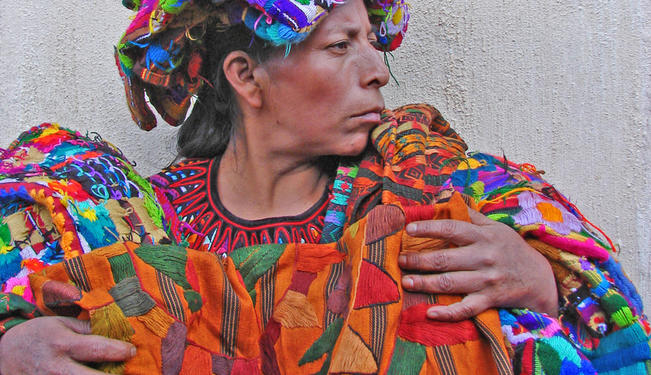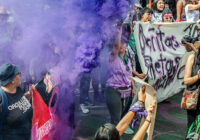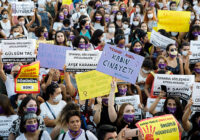Seventeen years after the end of a brutal civil war, Guatemala’s human rights record remains appalling.
Since its independence from Spain in 1821, Guatemala was ruled mostly by dictators and commercial interests. Late in the 20th century, resistance to the government grew and the country was devastated over the course of a 36-year-long civil war, which ended in 1996 with the signing of the Peace Accords.
The war, in which the United States backed the government of Guatemala, sought to eliminate the leftist insurgency through the military’s “scorched earth campaign,” which ordered more than 626 massacres of native Mayans, who make up nearly half of the country’s 13 million population, between 1978 and 1984. More than 200,000 people were killed or disappeared at the hands of the military and paramilitary forces.
Today, violence has reached levels higher than those of the country’s civil war. While the reasons behind the current situation are subject to debate, it is difficult not to make the connection between the election of former military leaders into the current government, signifying for some the return to military rule. Many suspect international corporations, eager to exploit Guatemala’s resources, are behind the trend. Democracy is in decline, and impunity continues to reign.
With this background, the Guatemala Human Rights Commission (GHRC) organized a delegation, in which I participated, in August 2013 to meet with the women who have arisen as leaders seeking justice and defending the land, to learn about their struggles and to offer our assistance.
Testimonies of Genocide
Guatemala made international history with the trial of General Efráin Rios Montt for genocide and crimes against humanity, as it was the first time that a former head of state was prosecuted for these crimes in his own country, by his own courts. The prosecution heard 101 witnesses, including 40 forensic experts and more than a dozen Mayan women that testified about systemic rape as a tool of war. The defense attorneys asked no questions of the women.
When a military officer, testifying anonymously, mentioned the current president, Otto Pérez Molina, as being involved in the genocide, the trial came to a screeching halt. The Constitutional Court intervened and ordered the trial stopped. However, the three-judge panel hearing the case ignored the order of the Constitutional Court and proceeded with the trial and sentencing. The trial court rendered a verdict of guilty and sentenced the general to 80 years, but the Constitutional Court then invalidated the verdict and released Montt. The three trial judges who found Montt guilty have since been granted precautionary measures (usually armed guards) by the Inter-American Commission on Human Rights (IACHR), due to concerns for their safety.
The Centro para la Acción Legal en Derechos Humanos (CALDH) and the Association for Justice and Reconciliation (AJF) organized the testimony of genocide and rape survivors. Our delegation listened to the testimonies of five of those victims. The women spoke about their lives before the military took over, what it was like during the war, what happened to them and their families, how they felt about the trial of Montt, and whether testifying at Montt’s trial had been a positive or negative experience.
Each of them had what they called “good lives” before the military came to their villages in the Mayan region. All of them were chased into the mountains by the military, which then burned their houses, killed their animals, and destroyed their crops.
One woman outlined the 16 members of her family that were killed or died of starvation or privation in the mountains. She was angry about her testimony now that Montt has returned home a free man. Another woman lost three children, but felt calmer after her testimony regardless of the legal reversal. The third suffered starvation with her two daughters in the mountains and remained bitter about the trial. The fourth woman watched the military burn two children alive inside a home. She was captured twice, said her husband was dead, and had refused to give any information to the military despite being tortured. The last woman who spoke was captured, tortured, and raped and then made to serve the military commander because she was so pretty. She is still pretty today, but her pain is written on the scars on her leg, under her fingernails, and in her heart. Every woman asked: “Where is justice?”
At San Juan Cotzel, the delegation met with Juana Sánchez of Flor de Maguey, a group of genocide widows. Ten of them testified at the Montt trial. Juana’s husband was murdered, her mother tortured, and herself captured. The soldiers told Juana they were to, “get rid of the trash in these towns” or “you are (to be) taken out with the trash.” The women of Flor de Maguey are getting too old to work the fields, if they have any, and want the reparations they never received.
Mining Corporations
After the signing of the peace accords, Guatemala created a new Mining Law in 1997, which gave mines favorable treatment and set off a flood of mining exploration. For example, in 2008, the government issued one reconnaissance permit, 105 exploration permits, and seven exploitation permits. More than half of these permits were in mountainous areas that have a majority Mayan indigenous population. However, in violation of the International Labor Organization (ILO) Convention 169 that seeks to protect the rights of indigenous peoples, the Mayan populations were not consulted. From 1996-1999, President Arzu’s government decided to privatize the energy sector; it created a new mining law that reduced royalties to the government from six percent to one percent, and allowed foreign companies to own 100 percent of the mine and escape taxes.
The law was passed without public consultation, as required by the Guatemalan constitution. It does not require consultation with the indigenous communities, nor take into consideration their collective land rights, attachment to ancestral territory, culture, or natural resources.
As a result, a violent confrontation occurred in 2005, which resulted in establishment of the High Commission on Mining that included government and religious representatives, academics, and civil society organizations – but no representatives of indigenous organizations or the communities affected.
In 2007, violence again erupted. In the court case that followed, the court ruled that seven articles of the 1997 Mining Law were unconstitutional. This put a halt to further licenses until 2012, when it resumed under the current president, Otto Pérez Molina.
Mobilizing Communities
Yolanda Oqueli is the chief organizer of Communities of San Jose del Golfo and San Pedro Ayampuc, known as La Puya. La Puya is fighting the engineering company Kappes, Cassiday & Associates, which is working with a Canadian gold mining company. The group has blocked the entrance to the mine for 18 months. Their peaceful protest movement has grown to hundreds of people and dozens of countries, especially from Central and South America.
An assassination attempt was made against Yolanda and she lives today with a bullet lodged near her spine. The IACHR has granted her precautionary measures and the government has to provide her with round-the-clock armed guards.
On September 7, 2013, an unidentified group of men drove through Nacahuil, an indigenous community an hour from Guatemala City where the residents were involved with the dissent at La Puya, and opened fire. Eleven people were killed and at least 12 injured. The locals suspect that the police, who had been expelled from the community six years earlier — leaving the community to do its own policing, following indignation at police violence and corruption — orchestrated the action because they had driven through 20-30 minutes earlier. The government has a history of instigating violent incidents so to impose military rule and then arrest dissidents.
In one Mayan area, the K’iche’ People’s Council is led by Lolita Chávez Ixcaquic, who is also protected by precautionary measures because of an attempted assassination. The council represents 87 Mayan communities that, in a very democratic process, unanimously rejected mining and hydro-electric projects. The foreign commercial companies have offered to pay them a higher percent of profits, failing completely to understand that the reason these projects were rejected is not monetary, but is linked to the refusal to allow destruction of the earth for religious and cultural reasons.
When our human rights delegation met with the US embassy staff in Guatemala, the deputy director spent 15 minutes speaking about how the rule of law does not work in Guatemala; so for the wrongs done to the Mayans and the women, no remedy existed. But when we discussed the attempt to exploit land by Kappes, Cassiday & Associates, the embassy responded that the US company had a valid permit so nothing could be done, even though they had not gone through the procedure required by ILO Convention 169.
Being a lawyer, I asked the rhetorical question: How is it that one resorts to the rule of law to excuse the actions of a large corporations, but not to defend the rights of the people?
Violence Against Women
According to the GHRC, violence against women has increased dramatically since the year 2000, estimating the death toll at 6,731 to date. These numbers place Guatemala as the regional leader in femicide. Women are often found tortured, mutilated, raped, and dismembered.
The reason for the increase in violence is tied together with the social problems listed above: when mining was privatized and permits re-opened, commercial interests did everything in their power to recover their money. As just one example, a Canadian company, Hudbay Minerals, has been sued for gang rapes of women and shootings of leaders and community members near their nickel operation in El Estor, Guatemala.
Perhaps unsurprisingly, 98 percent of the cases of violence against women remain unsolved. Only three percent of all rape cases in the US, which we know is dramatically underreported, result in conviction, so it is really well in line with our own faulty prosecution of rape.
One reason they remain unsolved is because police refuse to investigate. The Association of Women Generating Equality, Leadership and Opportunities in Chimaltenango is a holistic domestic violence intake center and shelter that also works on femicide. The office was robbed in 2012, but the police have yet to investigate. The director, Donessa Ortiz, told us that because of attacks they have had to build a wall and install gates.
La Red De Mujeres Ixiles in Nebaq is a network of nine organizations and 352 women that has grown since 2006. It operates a domestic violence intake center and women’s shelter that currently consists of mattresses thrown on the cement floor of a large meeting room. The leader, Juana Baca Velasco, is also under precautionary measures because of threats. The women have a talk and information program on the Catholic radio station called, “Peeling Potatoes.” They feel that women listen to other women when they are doing normal, household tasks.
Militarization
Recent trends indicate the beginning of a return to violent rule by military and commercial interests. Attacks on human rights defenders, including prosecutors and journalists, have increased 681 percent from 2000 to 2011; only two percent were prosecuted. The groups most attacked are indigenous people, especially those protecting the environment.
The organization Security in Democracy focuses on police and military reform. While the constitution separates military and police, it allows for a procedure for them to patrol jointly with a judicial decree – which the current president requested. Seeing soldiers patrolling their streets terrifies the Mayan population who were targeted by that same military for 36 years.
Sobered by the conditions the women work in and the dangers they face from a violent and hostile government, our final meeting was lunch at Casa Artesana, founded in 2006 by Andrea Barrios and Sandra Moran. They work with women in prison and re-entry, and offer art therapy. Because of security issues and other concerns, they were forced to close to the public, install gates, locks and a security camera. While recognizing the realities, Moran gave an impassioned presentation that the people of Guatemala have spirit, hope and strength and that “we are not overcome, we are rising, especially young women.”
In spite of the violence, women have arisen as the leaders in defending themselves, the land, the society and the culture, and they birth hope for the future.
The views expressed in this article are the author's own and do not necessarily reflect Fair Observer’s editorial policy.
Image: Copyright © Shutterstock. All Rights Reserved
Support Fair Observer
We rely on your support for our independence, diversity and quality.
For more than 10 years, Fair Observer has been free, fair and independent. No billionaire owns us, no advertisers control us. We are a reader-supported nonprofit. Unlike many other publications, we keep our content free for readers regardless of where they live or whether they can afford to pay. We have no paywalls and no ads.
In the post-truth era of fake news, echo chambers and filter bubbles, we publish a plurality of perspectives from around the world. Anyone can publish with us, but everyone goes through a rigorous editorial process. So, you get fact-checked, well-reasoned content instead of noise.
We publish 3,000+ voices from 90+ countries. We also conduct education and training programs
on subjects ranging from digital media and journalism to writing and critical thinking. This
doesn’t come cheap. Servers, editors, trainers and web developers cost
money.
Please consider supporting us on a regular basis as a recurring donor or a
sustaining member.
Will you support FO’s journalism?
We rely on your support for our independence, diversity and quality.








Comment